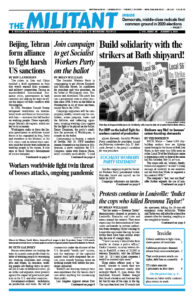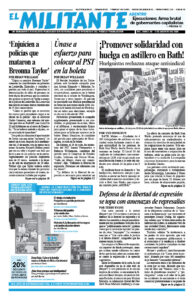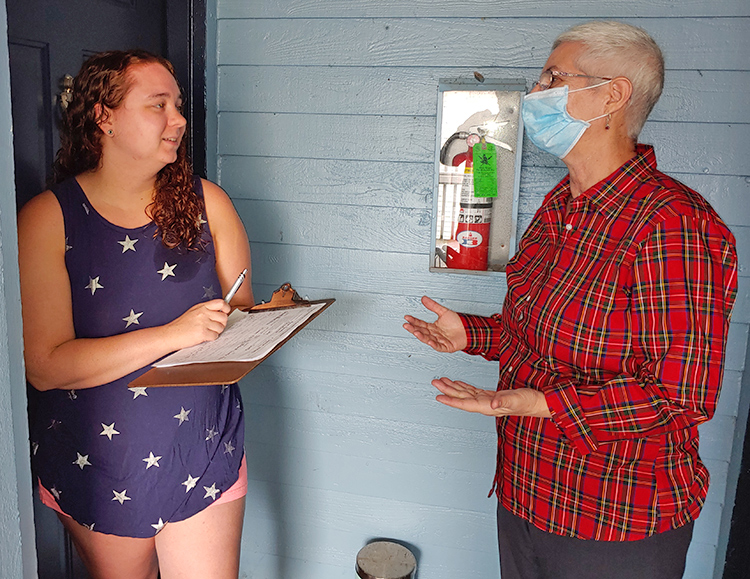The Socialist Workers Party is campaigning to get Alyson Kennedy and Malcolm Jarrett, its candidates for president and vice president, on the ballot in Washington state, Tennessee and elsewhere. The party has run a presidential slate in every election since 1948. It was on the ballot in Washington in all of those elections, except two in the 1950s.
Campaign supporters will be campaigning widely, introducing the candidates, action program, books and the Militant, and collecting signatures, winning working-class support for the fight to be placed on the ballot. Henry Dennison, the party’s candidate for governor of Washington, is already on the ballot.
Campaigning in Renton, a suburb of Seattle, July 19, SWP members Jeanne Fitzmaurice and Rebecca Williamson, a party candidate for U.S. Congress, spoke with Denise Olson, who’s currently on disability. “I used to be liberal, now I’m a conservative,” she said. “I defend freedom of speech. We must be tolerant of others.”
“Defending freedom of speech is necessary for building a working-class movement of millions that speaks and fights for all the oppressed,” said Williamson. “Workers need debate and discussion to get the political clarity needed to unite our class.”
“I’d be pleased to sign your petition,” Olson said.
The party’s presidential ticket is on the ballot in Colorado and Vermont. It has met all the requirements to file in the next week or so in Louisiana. In Tennessee — like in Washington — the SWP is organizing to campaign and gather signatures to get on the ballot in that state. The party is also campaigning in Minnesota and New Jersey, demanding state authorities put the party on the ballot given the obstacles caused by government-imposed coronavirus restrictions.
The SWP is the only party running in the 2020 election that campaigns to unite working people to defend our own interests.
Washington, D.C., campaigning
Supporters of the campaign of Omari Musa, Socialist Workers Party candidate for D.C. delegate to U.S. Congress, are finding widespread interest in the party’s platform as they talk to workers on their doorsteps, at protests against police brutality and with co-workers on the job and ask for help in putting him on the ballot.
The effort to get 500 signatures, double the requirement, to place Musa on the ballot received a boost July 18-19 when campaigners were joined by Kennedy and Jarrett. By the end of that weekend, volunteers had pushed the number of people signing up to over 430.
District officials lowered the requirement for ballot status in the delegate race from 3,000 to 250 signatures because of coronavirus restrictions.
James Harris, who helped organize the campaigners, told the Militant they got an especially good response to the party’s demand for a government-financed public works program to provide jobs thousands of workers sorely need. And that workers should fight for workers’ control over conditions on those jobs, so they can be done safely.
Campaign supporter Arrin Hawkins and Seth Galinsky, SWP candidate for U.S. Congress in New York, met child care worker Maria Beal after knocking on her door in Southeast Washington July 19.
“The Democrats and Republicans are two wings of the same party and though they have differences, they both defend the interests of the capitalist class,” said Galinsky. That’s why we need to build a labor party, Hawkins added.
Beal said she agrees, “but I dislike the Republicans most.”
The capitalists try to convince us to hold our nose and vote for the lesser evil, Galinsky said. But no matter which of the capitalist candidates wins, working people lose.
Beal welcomed the recent protests against police brutality, but rejected the looting. She believes that cops need to be licensed. “They will think twice before they brutalize someone if they might lose their license,” she said.
“The capitalist class pays the cops to protect and serve the rich against working people, and no license or reform will fundamentally change that,” Galinsky said.
“It’s not all or mostly about color,” Beal added. “It’s all about the dollars.”
“To end police brutality will require taking power out of the hands of the capitalist class,” Galinsky said.
Beal told him she wasn’t totally convinced, “But I am interested.” She signed the petition, bought a subscription to the Militant and a copy of Malcolm X, Black Liberation, and the Road to Workers Power. She also volunteered to organize a meeting for Musa at a nearby park where her friends and relatives often gather.
At an apartment complex in the city’s Northeast, Jarrett met 19-year-old Joseph Smith, who had recently attended his first protest, against the killing of George Floyd. He told Jarrett that on June 1, during a citywide curfew, he was one of a group of protesters boxed in by dozens of police in riot gear on a residential street. When police started to pepper spray them, a resident opened his door and let several dozen escape inside. They spent the night there.
“Many working people have experienced some form or another of police violence,” said Jarrett. “Malcolm X wanted to show us that our fights are part of the international fight by oppressed people against a common oppressor. I joined the SWP to get rid of capitalism. That’s what’s open to you.”
Smith added his name to the petition.
Campaigners also set up tables outside two area Walmarts over the weekend. “A number of people, including taxi drivers, customers and workers having lunch, came over to find out what we were doing,” said Walmart worker and SWP campaigner Glova Scott. Many signed to put Musa on the ballot.
“One worker ran up to the table to look at the books, and purchased Red Zone: Cuba and the Battle Against Ebola in West Africa, and Malcolm X, Black Liberation, and the Road to Workers Power,” she said.
Kennedy, Jarrett and Musa all spoke at the Militant Labor Forum July 18.
“From Bath, Maine, where shipyard workers are on strike against the bosses’ union busting to the Yakima Valley in Washington state where farmworkers walked out and won a contract at several fruit-packing plants, to sanitation workers in New Orleans fighting for improved wages and better working conditions, our campaign stands in solidarity with all these struggles,” Kennedy said.
“Our campaign explains the most important thing workers need to see is that all the problems we face today are the result of the fact that there are sharply counterposed class interests between the capitalist rulers and working people. You can’t ‘reform’ an exploiting class. You can’t reform the capitalist rulers’ state.
“The SWP stands against violence and looting. The entire block in Minneapolis where the George Floyd mural is painted is totally devastated and boarded up. The liberal New York Times editors say this is OK, because ‘property can be replaced and thus it’s not violence to destroy it.’” Kennedy said, “We say no! We look to the example of the Bolsheviks’ conduct during the Russian Revolution. They said ‘Comrades, we are not thieves,’ and convinced workers to stop the looting of the palaces, to defend the patrimony, history and resources of the country they were taking power in.”
SWP on ballot in Vermont
The SWP filed to put the party on the ballot in Vermont July 22 and was certified. “A fight by workers and our unions to wrest control of production and safety from the bosses is more sharply posed today as they press to pack more of us into plants shoulder to shoulder and crank up the line speeds,” Jarrett said at a press conference in Burlington. “But no worker has to die because of unsafe or unhealthy working conditions. The answer isn’t to shut the plants down, but for workers and our unions to take over control of all aspects of production and reorganize them to meet our needs.”
Join the campaign! To sign up to go to Washington, Tennessee or elsewhere to get the SWP candidates on the ballot, contact the campaign office nearest you.
Arlene Rubinstein in Washington, D.C., contributed to this article.


